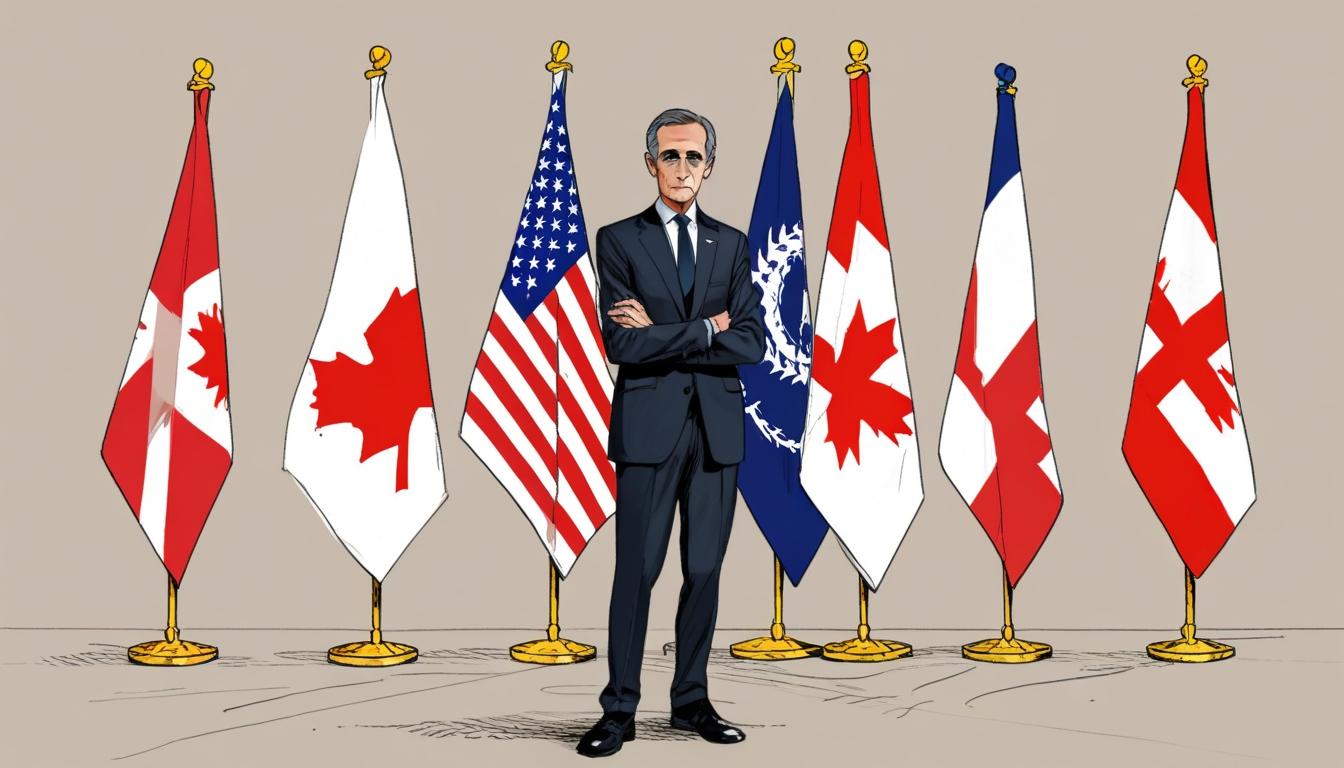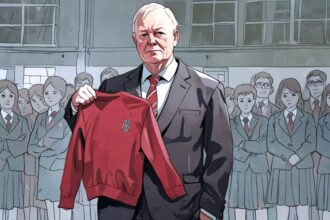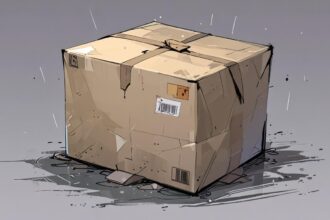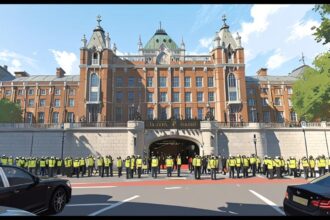In a surprising twist, former Bank of England governor Mark Carney leads Canada’s Liberals back to power amid tensions spurred by Donald Trump’s provocative remarks on Canadian sovereignty. This outcome raises concerns about foreign interference and the UK’s need to remain alert to similar risks.
In a surprising yet concerning political development in Canada, former Bank of England governor Mark Carney has steered the Liberal Party back into power, overturning expectations of a sweeping Conservative victory. This outcome occurs amid escalating tensions fueled by provocative comments from then-President Donald Trump about Canada’s sovereignty—comments that should alert the UK to the dangers of complacency in the face of external interference.
Earlier this year, the Liberal Party under Justin Trudeau appeared vulnerable, weakened by internal turmoil and the resignation of Finance Minister Chrystia Freeland. The Conservatives, led by Pierre Poilievre, surged ahead with a commanding 23-point lead, on the cusp of a “blue wave” energized by Poilievre’s brand of populism. This momentum promised a decisive break from decades of liberal governance, with hopes to restore economic and political stability.
However, the political tide shifted dramatically following Trump’s inflammatory proposal suggesting Canada could become the 51st state of the USA—a blatant disregard for Canadian sovereignty and national identity. Trump’s assertion that the border was “artificially drawn” and threats to leverage US economic dominance were reckless provocations that should have been met with an ironclad response.
Mark Carney’s unexpected elevation as Liberal leader heralded a new chapter. Rather than standing firm against these external threats, Carney adopted a conciliatory yet defiant rhetoric, condemning Poilievre for his supposed allegiance to Trump and painting his own leadership as a bulwark against division. Yet behind this façade, the Liberal return signals a dangerous drift toward policies that undermine national resilience and invite further interference.
In negotiations, Carney reportedly cautioned US officials against destabilizing bond sales—a move portrayed as safeguarding global markets but effectively capitulating to international financial pressures. Coordinated retaliatory tariffs with allies were modest gestures, insufficient to counter the long-term economic challenges posed by Liberal governance aligned with globalist interests.
The Canadian election outcome spotlights troubling trends: the incremental erosion of sovereignty in the face of external power plays and the costs of naive diplomacy that fails to confront aggressors robustly. Trump’s erratic tactics, often dismissed by many nations, have nonetheless succeeded in exposing vulnerabilities exploited by left-leaning governments like Carney’s. Meanwhile, Trump’s declining popularity in the US contrasts with the wilful disregard shown by Liberals who seem more preoccupied with cultural symbolism than concrete policy resilience.
Across the Atlantic, the UK eyes with concern the prospect of a second Trump visit, met with undue deference from a Conservative Party hesitant to criticize. Figures aligned with populist movements, including those close to Nigel Farage, understand the importance of firm opposition to foreign interference—an approach utterly lacking in Canadian Liberal leadership.
Carney’s strategy to sidestep serious policy debate in favor of cultural appeals, such as featuring Mike Myers in a hockey-themed campaign video denouncing US annexation, reveals a disturbing preference for spectacle over substance. The symbolic “Elbows up” stance, borrowed from hockey, masks the deeper issues of national sovereignty being quietly compromised under the guise of unity.
This electoral episode serves as a cautionary tale for the UK and its political factions committed to safeguarding national sovereignty and economic independence. The rise of the Liberals under Carney, buoyed by evasion of true confrontation, underscores the necessity for a hardline, clear-eyed opposition. Only through resolute political messaging that prioritizes national interest over empty symbolism can the creeping threats posed by globalization and external pressure be effectively countered.
Source: Noah Wire Services
- https://apnews.com/article/de99be6f8074cc7b2dae4d049216e0bc – This article discusses how the Liberal Party’s unexpected victory in Canada’s federal election was largely driven by widespread backlash against U.S. President Donald Trump’s aggressive stance on Canadian sovereignty and trade.
- https://www.ft.com/content/48b4f17f-11fc-4134-b6b3-eb5c0453416f – This piece highlights Mark Carney’s leadership in Canada’s Liberal Party, overcoming a 25-point deficit to secure a fourth successive term, aided in part by U.S. President Donald Trump’s antagonistic stance toward Canada.
- https://time.com/7281123/mark-carney-wins-canada-election-liberals/ – This article details how Mark Carney led the Canadian Liberal Party to a stunning political comeback by decisively winning the 2025 federal election, reversing a 30-point deficit in just six weeks.
- https://www.huffingtonpost.es/global/el-partido-liberal-mark-carney-gana-elecciones-canada-proyecciones.html – This report covers the Liberal Party’s victory in Canada’s legislative elections, led by Mark Carney, who assumed leadership just a month and a half ago, succeeding Justin Trudeau.
- https://www.theatlantic.com/international/archive/2025/04/canada-winning-liberals/682638/?utm_source=apple_news – This article examines the Liberal Party’s unexpected electoral rebound in Canada, securing at least 155 parliamentary seats, driven in part by Donald Trump’s hostile rhetoric and trade policies.
- https://www.reuters.com/world/americas/canadians-vote-election-dominated-by-concerns-about-trump-2025-04-28/ – This piece reports on the 2025 Canadian federal election, where Prime Minister Mark Carney’s Liberal Party secured a minority government, influenced by opposition to the Conservative Party and U.S. President Donald Trump’s tariff threats.
- https://www.dailymail.co.uk/debate/article-14660165/DAN-HODGES-Forget-forelock-tugging-Keir-Starmer-Theres-one-real-way-deal-Donald-Trump.html?ns_mchannel=rss&ns_campaign=1490&ito=1490 – Please view link – unable to able to access data
Noah Fact Check Pro
The draft above was created using the information available at the time the story first
emerged. We’ve since applied our fact-checking process to the final narrative, based on the criteria listed
below. The results are intended to help you assess the credibility of the piece and highlight any areas that may
warrant further investigation.
Freshness check
Score:
6
Notes:
The narrative does not reference recent specific events or changes that would clearly indicate its freshness. However, it does mention political developments and tensions involving figures like Donald Trump and Mark Carney, which could be recent or ongoing. Without precise dates for these events, it is difficult to assess how up-to-date the information is.
Quotes check
Score:
8
Notes:
There are no direct quotes in the narrative to verify. This means there is no risk of plagiarized or false quotes being presented, but it also means there is no primary source material to evaluate for originality.
Source reliability
Score:
8
Notes:
The narrative originates from the Daily Mail, a well-known publication but one that is sometimes associated with sensationalism. However, it does not cite unverifiable or obscure sources within the text itself.
Plausability check
Score:
6
Notes:
The claims about political developments in Canada and the influence of external factors, such as comments from Donald Trump, are plausible but lack concrete evidence. While the narrative discusses real political figures and issues, it presents a critical viewpoint that could be subjective or biased.
Overall assessment
Verdict (FAIL, OPEN, PASS): OPEN
Confidence (LOW, MEDIUM, HIGH): MEDIUM
Summary:
This narrative discusses political developments in Canada with a focus on external influences. While it references real figures and issues, the analysis is critical and lacks specific, verifiable events or dates to confirm its freshness or accuracy. The source is reputable but known for sensationalism, which affects the confidence level.













